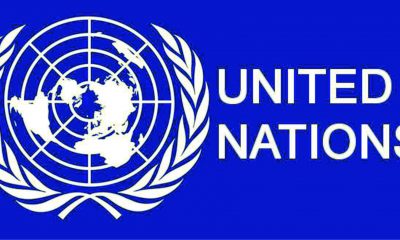Editorial
That Unwholesome PMS Saga

After years of normalcy in fuel supply and distribution, driven by the current monopolistic importation
arrangement of the Nigerian National Petroleum Corporation (NNPC) Limited, Nigerians woke up to the sudden return of queues at filling stations, with some unfortunate consumers paying for bad Premium Motor Spirit (PMS).
Strong clues have emerged that superfluous and inequitable profit-seeking practices by some contractors handling NNPC crude-for-fuel swap contracts were responsible for the regrettable incident. This ugly development is a manifestation of the high level indiscipline and the mediocre leadership of the oil sector management by the NNPC.
Last month, petroleum products with methanol content above Nigeria’s specifications were imported into the country. The NNPC Group Managing Director (GMD), Mele Kyari, said the importation was made by some suppliers under its Direct Sales Direct Purchasing (DSDP) arrangement through four premium motor gasoline cargoes. The DSDP structure is part of the Corporation’s plan of action to ensure the sustained supply of petroleum products in the country.
A frail spot in the system was exploited to take these shipments into the country. While the pre-shipment/pre-emission standard test parameters for most countries include oxygenation and methanol, this standard had probably not been endorsed by Nigerian regulators. This is a flaw deliberately exploited by adversaries of the nation to produce the adulterated PMS.
Most of the contractors market the sweet crude from Nigeria and in turn source a less quality and cheaper methanol-blended product, which make their way in through enervated regulatory authorities. We call for the urgent blacklisting of the companies and terminating of government officials, who are alleged collaborators in this impish deed.
While the harmful consequence of regulatory lax convulses Nigerians, The Tide urges transparency and accountability in the DSDP scheme. We maintain that sanctioning everyone who played any role in the episode remains a leeway. Importing poor-quality fuel that cannot be sold in any other country to Nigeria is a social, economic and environmental monstrosity and an international discomposure.
Although Kyari has regretted the great deal of damage caused by the substandard fuel, Nigerians deserve better than an apology. Indeed, the time is long overdue for President Muhammadu Buhari to quit the position of Minister of Petroleum Resources who, from all indications, is incredibly guilty of complicit nonchalance of happenings under his watch.
A key worry is that four of the oil companies (MRS, Emadeb, Brittania-U and Oando) accused of importing the substandard petrol curiously denied the allegation, creating more complication in the move to unveil shippers of the bad fuel. Only Duke Oil, NNPC’s trading arm, has remained mute about the accusation. The GMD’s close-mouthed stance on the renunciations by the firms he earlier held responsible for importing the toxic fuel is not only disquieting, it smacks of complicity.
The NNPC boss again stated that the cargoes’ quality certificates issued at the load port (Antwerp-Belgium) by AmSpec Belgium indicated that the gasoline complied with Nigerian specifications. He then noted that as a definitive procedure for all PMS imports to Nigeria, the said cargoes were equally validated by inspection agents appointed by the Nigerian Midstream and Downstream Petroleum Regulatory Authority (NMDRA).
A further extenuation by Kyari states: “It is important to note that the usual quality inspection protocol employed in both the load port in Belgium and our discharge ports in Nigeria do not include the test for methanol content, and therefore, the additive was not detected by our quality inspectors.” The question is, did the validators not notice anything eerie or eccentric about this batch, or did they feel Nigerians did not deserve better than what they got? The Belgian firm from where the fuel was brought in should be indicted and made to face charges.
This phenomenon underscores the need for Nigeria to end the age-old importation of fuel. Our inability to refine a single litre of petrol in a country widely reputed to be a foremost global oil producer is disreputable. That means 100 per cent of petrol in the country is imported. The rapid rehabilitation of the existing refineries and the construction of additional ones are imperative.
To ameliorate the prevailing dearth of PMS, the NNPC assured that every step would be employed to restore supply in the country and that 2.1 billion litres of petrol were already in their custody while enough quantities had been ordered. If that is the case, why is the product still in short supply to date? Beyond the repeated assurances, Nigerians need to understand when the unpleasant situation will cease.
If the events of the last few weeks are anything to go by, the NNPC leadership has failed spectacularly and should not be spared for its disconsolate failure. It must not be lost on the Corporation that it is now a limited liability company, operating under the Companies and Allied Matters Act (CAMA) and no longer relishing the franchise of being a government agency.
The cost implication of the dangerous petrol is worse for individuals and corporate bodies who got their vehicles and fuel-powered machines badly damaged as a result, and especially for the country’s economy. Somebody, particularly the NNPC, must pay a price for this. There is a need for the establishment of a compensation committee to evaluate claims of affected Nigerians.
A full-scale investigation into the matter to unmask the culprits for appropriate sanction is exigent to stanch a recurrence. Meanwhile, the NNPC should institute legal proceedings against importers of the bad PMS, considering the painful effect the sudden and unforeseen withdrawal of petrol from circulation has caused Nigerians, who are moaning as the cost of goods and transport fares have shot up across the country.
Editorial
New Federal Varsity In Ogoni

President Bola Ahmed Tinubu has made history by signing into law a bill that establishes the Federal Univer-
sity of Environment and Technology in Ogoni, Rivers State. This significant occasion marks a bold step forward not only for the Ogoni people but also for the Niger Delta region and Nigeria as a whole. It signifies a commitment to education, environmental sustainability, and technological advancement.
For the Ogonis, who have long been impacted by environmental challenges, the university represents a beacon of hope. It is more than just bricks and mortar; it is a symbol of empowerment and a pathway to a brighter future. This development is akin to a seed, planted with the promise of a flourishing harvest of skilled professionals.
The university’s emphasis on environmental technology is extremely important, especially given Nigeria’s climate crisis. Education plays a crucial role in developing sustainable solutions. The institution will provide students with the necessary skills and knowledge to address the environmental challenges affecting the Niger Delta region and beyond. This will have a momentous impact.
Signing the bill, the President praised the Ogoni people’s resilience and unity. He stressed that the institution would mark a “significant milestone in our national journey towards environment justice, education and sustainable development”. Tinubu said the university is a reaffirmation of his administration’s “unwavering commitment to the people of Ogoni, the Niger Delta and the nation as a whole. For decades, the Ogoni people have been at the forefront of fight for environmental restoration and sustainable development, shaping both national and global conversation of these critical issues.
“By signing this bill into law, we are taking a decisive step towards addressing historical grievances and creating new opportunities for learning, growth and prosperity. The university will serve as a centre of excellence, equipping young Nigerians with the knowledge and skill to tackle present environmental challenges, drive clean energy solutions and contribute to our national sustainable economic development.”
We commend President Tinubu for his visionary decision to establish the much-needed institution aimed at fostering development and progress. This initiative is a testament to his commitment to addressing critical social and economic knots and creating opportunities that will benefit the people. The President has laid a solid foundation for sustainable growth while demonstrating a genuine desire to empower and advance the nation’s collective interests.
In addition to his commendable action, we applaud Tinubu for initiating peace talks to bring stability and reconciliation to the troubled area. The decision to engage in constructive dialogue demonstrates a deep understanding of the relevance of inclusive governance and the role of peace in fostering meaningful development. For decades, Ogoni has endured turmoil and neglect, impeding its potential and the return of oil exploration activities.
By opening the door to peaceful negotiations, the President has made a bold and necessary move towards healing fractured relationships and fostering trust among stakeholders. This initiative holds the promise of ensuring that the voices and needs of the Ogonis are heard and respected. We urge all parties involved to seize this golden opportunity for lasting peace and progress. It is only through unity and mutual respect that the full potential of Ogoni, and by extension the nation, can be realised.
As steps are taken to acknowledge and remediate the damage caused by years of oil exploration and production, the Ogonis must reciprocate Mr. President’s gesture by fostering a climate of equanimity and stability. This will ultimately pave the way for the resumption of oil exploration and production. This is not a call to forget the past, but a pragmatic recognition that meaningful change and sustainable development require a collaborative approach.
The Federal Government has a responsibility to ensure that all academic disciplines offered by the new university are fully accredited to maintain the integrity and quality of the school. Without proper accreditation, the institution risks producing graduates who are ill-equipped to compete in the global workforce or contribute substantially to national development. Accreditation serves as a benchmark that ensures programmes meet academic standards and adhere to best practices across various fields of study.
Staff recruitment should be conducted carefully, as the individuals brought into a team can greatly influence an organisation’s performance, culture, and long-term success. The primary focus of recruitment efforts at the university should be on attracting the best candidates who possess the necessary skills, qualifications, experience, and values. Merit should be the guiding principle in decision-making throughout the hiring process, rather than favouritism or personal bias.
For a nation to thrive in the 21st century, a strong higher education system is not only desirable, but essential. Universities serve as the catalysts for innovation, the breeding grounds for future leaders, and the foundations of a knowledge-based economy. The Federal Government must acknowledge this vital role and take intentional actions to properly fund the university in Ogoni and develop infrastructure to ensure it meets international standards. Neglecting this responsibility would put its future prosperity and global competitiveness at risk.
This institution must not suffer the same fate as other federally-owned universities that have been left to decay. That will be a disservice to its purpose and potential. Many government-owned universities in the country have struggled with dilapidated infrastructure, underfunding, insufficient staffing, and interruptions caused by industrial actions due to unpaid wages or poor working conditions. These challenges have led to declining standards in education, putting both students and staff at a disadvantage. The Ogoni University must not be another victim of this worrying trend.
Editorial
HIV, Transiting From Donor Dependence

The initial announcement by United States President, Donald Trump, to cut funding for international
HIV/AIDS initiatives sent shockwaves through the global health community. In Nigeria, a country facing a significant HIV/AIDS burden, the potential consequences were dire. However, the subsequent waiver granted by the administration has provided a lifeline for the millions of Nigerians who rely on the President’s Emergency Plan for AIDS Relief (PEPFAR) for their treatment and support.
PEPFAR has been an important partner in Nigeria’s fight against HIV/AIDS. Since its inception in 2003, PEPFAR has committed more than $7.8 billion to the country, catering to approximately 90 per cent of HIV treatment requirements. With this funding, Nigeria has been able to enhance its HIV prevention, treatment and support services and has witnessed a reduction in HIV/AIDS deaths.
The waiver granted by the Trump administration guarantees that PEPFAR’s life-saving medicines and medical services will continue to reach the needy. Antiretrovirals (ARVs) are the most common type of medicine used to treat HIV and reduce the virus’ spread. Through the provision of ARVs, PEPFAR helps prevent the spread of HIV and enhances the quality of life of those with the condition.
Although Nigeria was recently exempted from the requirement, the signs are evident: the country has to graduate from dependence on donor funds for its HIV/AIDS control programmes. Over the years, partners including the U.S. government have been central to the provision of treatment to people living with the virus. However, it is time for Nigeria to own its national response to HIV/AIDS.
Nigeria’s HIV/AIDS burden remains critical, accounting for 10 per cent of the global total. In 2023 alone, there were 75,000 new infections and 45,000 HIV-related deaths. The battle against Mother-to-Child Transmission remains challenging, with only 35 per cent of the target 75 per cent being met. Nearly 1.7 million Nigerian children have been orphaned due to HIV. Vulnerable populations, especially women and children, continue to disproportionately suffer.
To transition away from donor dependence, a multifaceted approach is necessary. Firstly, the country must increase its domestic financing for HIV/AIDS programmes. This can be accomplished through innovative funding mechanisms, such as leveraging public-private partnerships and exploring local revenue sources. Secondly, the government needs to strengthen its healthcare system to ensure equitable access to testing, treatment, and care. This involves expanding access to antiretroviral drugs, investing in community-based models, and addressing the stigma associated with HIV.
Thirdly, Nigeria must prioritise prevention efforts. This entails promoting condom use, providing comprehensive sexual education, and increasing awareness about the risks and modes of transmission. By focusing on prevention, the country can decrease the incidence of HIV infections and ultimately lessen the burden on its healthcare system.
Finally, Nigeria should develop a sustainable human resource strategy for its HIV/AIDS response. This involves training and equipping healthcare workers, engaging community volunteers, and empowering people living with HIV to advocate for their rights. A well-trained workforce is essential for delivering high-quality services and ensuring the long-term success of the response.
The transition beyond donor dependence is a complex but necessary journey for the country. By increasing domestic financing, strengthening healthcare systems, prioritising prevention, and investing in its human resources, the country can create a sustainable and effective response to HIV/AIDS. Also, the government should consider alternative funding mechanisms, such as increased domestic funding, public-private partnerships, and philanthropic initiatives. The time to act is now, for the well-being of present and future generations.
Nigeria’s National Agency for the Control of AIDS (NACA) has made momentous strides in combating HIV/AIDS, including expanding access to testing, treatment, and education. However, challenges persist, hindering the effectiveness of these efforts.
One major obstacle is limited access to healthcare facilities, particularly in rural areas. This impedes timely diagnosis and treatment, reducing the likelihood of optimal outcomes for those living with HIV. Additionally, stigma surrounding the disease remains a formidable barrier, preventing individuals from seeking testing and care. Inadequate awareness campaigns further contribute to low testing rates and delayed diagnosis.
Addressing these challenges requires concerted action by the government and stakeholders. Allocation of adequate funding is crucial to expand healthcare infrastructure and ensure the availability of essential services. Moreover, targeted interventions to reduce stigma and promote awareness are vital for increasing testing and early detection.
Collaboration between civil society organisations and grassroots movements is also essential for advocating for protection of HIV funding. Advocacy campaigns can mobilise public support and pressure lawmakers to prioritise the fight against HIV/AIDS. By addressing these challenges and ensuring sustainable funding, Nigeria can depend less on donor countries, drastically reduce HIV transmission, and provide the necessary care to those affected by the disease.
Editorial
Israel-Gaza War: Sustaining The Ceasefire

-

 News5 days ago
News5 days agoWFP Votes $2.5bn To Fight Hunger, Malnutrition In Nigeria
-

 Editorial5 days ago
Editorial5 days agoHIV, Transiting From Donor Dependence
-

 Politics2 days ago
Politics2 days agoPDP Stalwart Canvases Support For PHALGA Mayor
-
Education1 day ago
LG Boss Inaugurates 11-Man Scholarship Board
-
News5 days ago
Old Boys Plan Rehabilitation Of GSS, Okehi
-

 Sports2 days ago
Sports2 days agoDikko Pledges Support For NDF
-

 News2 days ago
News2 days agoTinubu Hails Fayemi’s Contributions To Democracy On 60th Birthday
-

 Niger Delta1 day ago
Niger Delta1 day agoUkpai, Others Predict Better Future For D’Gov’s Home Town

